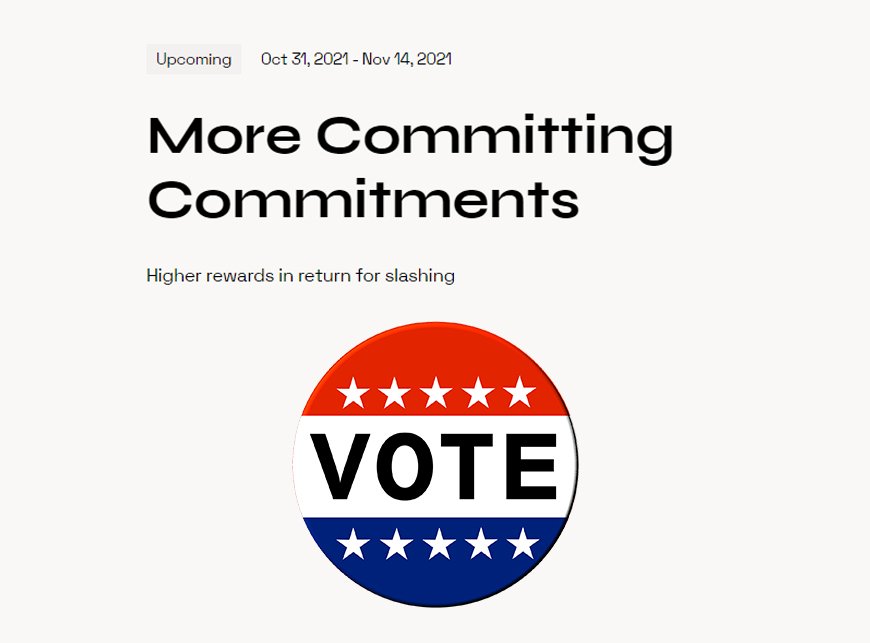After explaining how algorand governance works, in this lesson, and delving into everything you need to know about voting, in this other lesson, it is now time to deal specifically with the topic of the first governance trial period vote.
1- Question and options
What follows is the overview of the voting:
Under the current governance system of the Algorand Foundation, governors must commit to maintaining a certain balance in the governance wallet and attend all voting sessions. But the only penalty for violating this commitment is not receiving their governance rewards. In this voting session, we ask whether the governors wish to move to a stronger form of commitment, with more sanctions for violation, in exchange for higher rewards.
Instead, these are the possible responses:
Option A: Keep the current system. The amount of Governance rewards for 2022 will be 282 million Algo (70.5 million per quarter) while maintaining the current simple blocking mechanism: rewards are distributed among governors who vote and keep Algo committed to the portfolio for the entire quarterly period. Governors who fail to do so will lose their rewards, but will not incur additional penalties.
Option B: Higher rewards and cuts. The amount of Governance rewards for 2022 will be 362 million Algo (90.5 million per quarter) with a cutoff mechanism: rewards are distributed among governors who vote and keep Algo committed to the portfolio for the entire quarterly period. Otherwise, governors will be subject to an 8 percent reduction in the committed amount, in addition to the loss of their rewards.
Let us try to analyze this first vote.
Undoubtedly it starts with a very important decision, at stake is the rigidity with which violators of governance rules will be punished.
While it is true that registering for governance is a right (which one is not obliged to exercise), it is also true that, once registered, one also has duties, the most important of which is to vote.
Under Option A, the one recommended by the Algorand Foundation, the penalties for those who fail to complete their duties will remain as they are at present, i.e., very mild. The only penalty will be the inability to receive the rewards for the quarter in which one is enrolled.
Option B, on the other hand, will have much stiffer penalties, an 8 percent curtailment of the Algo committed for the governance quarter.
2- How the curtailment will occur in option B
Should Option B win out, when you sign up for a governance quarter, 8% of your committed Algo will be sent to an escrow account and you will have to commit to two duties:
- Maintain the balance in the portfolio at or above the amount of Algo committed for the governance quarter;
- They will have to attend all voting sessions.
If these duties are not met, in addition to not being credited with rewards, the 8 percent deposited in the escrow account will not be returned and will instead be sent to the Algorand Ecosystem Resource Pool (AERP), an Algo pool that currently has more than 3 bln Algo.
Algo subtracted for penalties will then be dedicated to future rewards for governors.
3- Economic point of view
As can be seen, depending on the option chosen, the amount of Algo allocated for rewards for 2022 will change:
- Option A: 282M Algo (70.5M per quarter);
- Option B: 362M Algo (90.5M per quarter);
In both cases, the total amount of Algo allocated for governance rewards for the 2021-2030 decade does not change, which remains fixed.
What does change is to accelerate or postpone the distribution of these Algo.
The first option is to save 10% of the Algo allocated for rewards for 2022. 10% that will be distributed in subsequent years, 10 M Algo per year, increasing governance rewards for the years 2023-2025.
The second option is a 15% increase in rewards for 2022, resulting in a decrease in rewards for years 2023-2025 of 12.5 Mdi Algo per year.
4- What is worth voting for?
Obviously, this is a question that cannot have an unambiguous answer.
Two camps definitely emerge: on the one hand, those who have the certainty of complying with the duties because they are very involved in Algorand and have an interest in voting. In this case, it might be convenient to vote for stiffer penalties, because they entail more rewards (in the future) for those who comply with duties and a disincentive for those who are attracted to governance only for the rewards.
On the other hand, there will be all the less loyal users, attracted mainly by the rewards, who may find a penalty system such as Option B very disadvantageous.
We cannot recommend an option; it depends on too many subjective factors.
The one thing we can say, however, is that the Foundation recommends voting for option A, the one with the lightest penalties.

